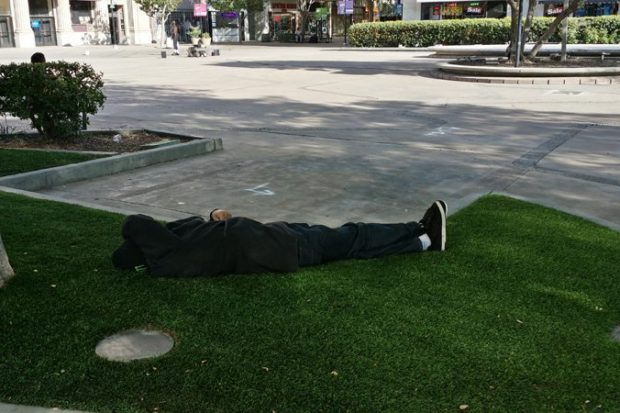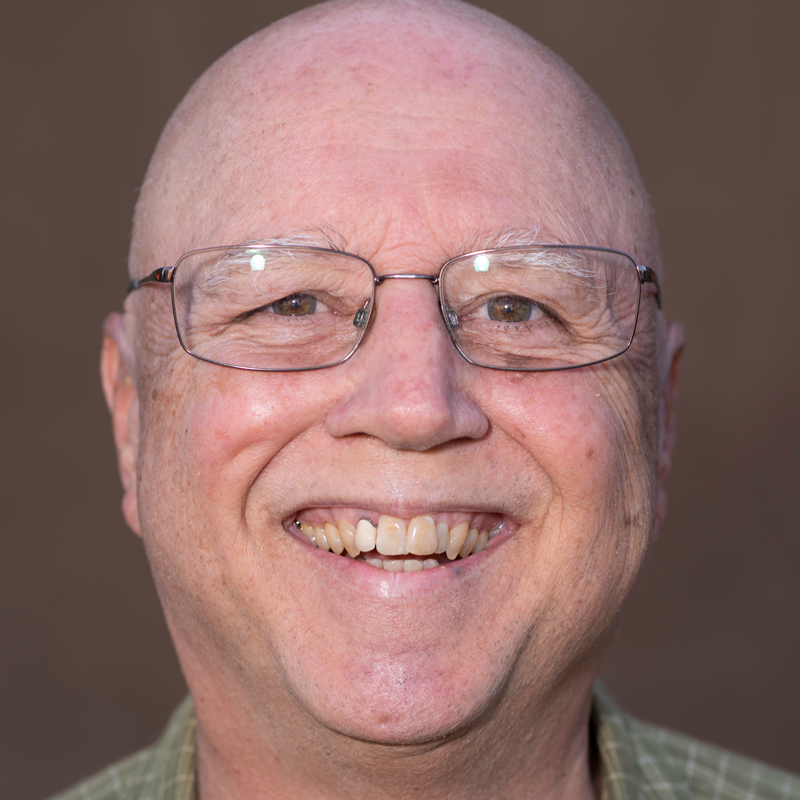

By Leonard Adame
When we drove past the big silos on H and Palm streets, I saw mostly old men moving as if they were walking up a rocky hill. They took their time, every so often spitting out a gob of tobacco juice as they zigzagged along the uneven sidewalk. To me, at 10 years old, the old men didn’t seem to fit, as if they weren’t supposed to do what they were doing.
Everyone I knew didn’t wear old, dirt-spotted clothes and shoes so worn it was as if they were about to die, like stray cats and dogs. The shoes of everyone I knew were shiny as mirrors, their pants creased, their shirts as stiff as mannequins. So why, I thought to myself, did these old men walk the sidewalk in soiled duds? And where were their cars? Everyone I knew had cars.
Sometimes at night, my dad and I drove behind the tall silos, themselves looking forlorn and down and out, and on to G Street. As far as I could see, campfires winked at me, and I smelled coffee and some type of meat frying or roasting. Somehow the hoboes had frying pans. Not the heavy 15-inch kind that my dad used in our restaurant. They had small dinged pans, though the frying surfaces were, nonetheless, shiny even as the rest were encrusted with something black.
On early mornings, in summer, we drove to my grandfather’s house, and again we passed the rear lot behind the stark silos. Blue smoke rose and hovered above their tents, and as we passed, I saw some of the men slip out of their tents wearing long johns, holding straight razors and a bowl of (really cold, I thought) water and a little mirror. It had to be the shiniest thing they owned, I thought, shiny things being important to kids and all.
My mother called them hoboes, but my dad said, no, they were bums who didn’t want to work, who wanted handouts. They were drunks, he argued, guys who wanted only booze. I thought of my dad and his friends at our family parties: everyone drinking Budweiser, singing and playing guitar, inevitably getting drunk.

After everyone had left for home, I locked up the restaurant, making sure the gas knobs on the stoves pointed to off. In the car, my dad said for me to sit next to him and that he would work the gas pedal and the brakes while I steered. He’d had too much Bud and couldn’t see, though he said he just wanted me to start learning to drive.
So there we were driving down Old 99 along Roeding Park at two in the morning, me steering and my dad dozing. I had to nudge him hard so he’d stop at the lights. That was scary because sometimes it took two or three nudges. Once I had to slap him on the cheek, and he got mad. I said, Dad, there’s a red light. Somehow, tires squealing, we stopped, then, my heart thundering, finally continued home. I still ask myself why we didn’t get pulled over or crash since my driving required me to use the entire road, going side to side, tacking like a boat.
But I wondered: if my dad could get drunk with his friends and family, why did he get mad at the “bums” who drank? I couldn’t figure this out. So I asked my dad, and he said, “Well, I work every day and I don’t ask for handouts.” Oh, I said. But that just made me wonder more about it all.
My mother was more charitable, often making sandwiches and coffee for the hoboes who knocked on our door. The gratitude in the hoboes’ eyes was as clear as water and as deep. Now I think that her piety was not wasted.
So here I am in 2014, thinking about this part of my early life. And here I am walking the Fresno Mall, where I look at people who aren’t hoboes but who are, in many people’s estimation, bums looking for handouts. Homelessness is a concept foreign to the detractors, maybe because it doesn’t allow them to be superior and/or assume the “right” to judge others.
On the mall, they don’t build fires or pitch tents every night, they don’t shave in the morning before a shiny mirror, they aren’t hopping the train for somewhere better in another city or “hobo jungle.”
The mall “looks like Alcatraz,” one homeless woman told me. “It’s just nothing but cold cement.”
Cold cement and people sleeping on the small grassy islands. Or people nodding as they recline on one of the “cold” cement benches, or people deeply slumbering as night saturates the mall, in doorways or behind trash dumpsters.
I’d never seen people sleeping in these places when I was a kid. There must have been some who did, but I never saw them. The difference, obviously, is that these days, more and more people are losing homes, families, cars, losing touch with “reality.” They talk to unseen people, run from nocturnal demons, make speeches in front of Club One looking like a politician in all but clothing and jewelry. Or they just quietly ask for money as I pass. Some, though, demand money, saying, “Hey, I got to eat today.”
The mall is their route, their jail cells, barless, open to anyone who wants to see their misery, their desperation, their dirty clothes and the brambles that are their beards. Some manage to wash every day, but too many just don’t. Who can blame them? They’ve lost the need for social decorum, the desire to cultivate their personas every day until they again become the acceptable shadows that ruthless jobs require. So now they just move silently along, pausing at times beneath the trees or crossing, again and again, the little bridges that span the desiccated fountains.
A few days ago, I met my daughter Marcie near the Clock Tower. I’d been wanting to try the new espresso shop on the corner. Just a little west, on Mariposa, a man slept on the mini lawn beneath a small tree near the coffee shop’s window. He was in deep sleep, unaware when I took his picture. I couldn’t see his face, and I didn’t want to.
As usual the guilt started settling in: I get a few retirement bucks every month; I drive a 17-year-old pickup; got a bed that’s a little lumpy but still serviceable every night; and hot food every day. I take hot showers, shave before a big mirror, grab clothes from the dryer or closet. In short, I have, like so many people, a good life, which also includes shelves of books, Internet connection, cable and people who care about me, especially my grandkids. Most of these things are little luxuries, I know.
So I am extremely lucky. But I don’t know that equally fortunate people who have those things and more appreciate their good fortune. Often, the brittle tone of righteousness in their voices, they claim to have earned everything they have, that no one gave them anything. So “why,” they profess, “should they help the bums who ‘choose’ to be jobless and homeless?” I guess they’d rather base their self-worth on things rather than people.
I have one answer for those who chastise the homeless: Help them as much as you can! Because it’s what Christians are supposed to do. Somehow that gets lost in the equation concerning the worth of all human beings.
Because so many people don’t care about homelessness, it certainly seems that the man asleep near the new coffee shop by the clock tower will spend many more months on that lawn, sleeping, perhaps dreaming he’s not there or that he too will someday have shiny things—or at least a hot meal.
And I guess, like when I was a kid, I’ll still be passing by people who’ve been condemned to isolation, like those behind the silos and like those who have been exiled to the cold cement of the mall.
*****
Leonard Adame has retired from teaching college English. He now plays drums in various bands, takes photographs, reads mystery novels to a fault and has published poetry in college anthologies. He most enjoys re-learning about human beings from his grandkids. Contact him at giganteescritor@hotmail.com.

